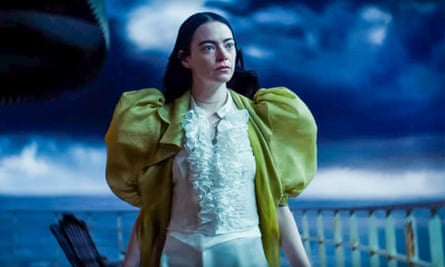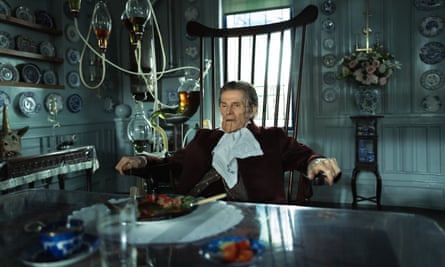‘A middle-aged straight man’s fantasy about nymphomania’
Samira Ahmed, presenter of Front Row on BBC Radio 4 and trustee of the Centre for Women’s Justice
I wanted to enjoy Poor Things. Emma Stone is a terrific actor, Mark Ruffalo a genuine good guy activist playing a cad. Hilarious! But Bella, Stone’s character, has an infant’s brain – and the consent issue for a woman with learning difficulties is a blazing red flag. She embarks on a “voyage of self-discovery” which leads, quickly, to an insatiable desire for sex with as many men as possible, one of the oldest abuser myths. In the 1970s, pornographers jumped on the women’s liberation movement, claiming sexual liberation was essentially never saying no.
As a work of fiction, Poor Things can explore anything it likes, but it is not feminist. Just because a woman chooses to do something, does not make the act feminist. Feminists challenge the patriarchal system in which women’s choices exist. Prostitution has always been romanticised by men in fiction, but it remains overwhelmingly the male exploitation of poor female bodies. Men – always much older and sometimes with visual deformities (raising questions about the degrading treatment of people with disabilities) – use Bella’s body without any attempt at foreplay. She is bound and gagged in a scene played for laughs.
A man forces his young sons to watch him have sex with Bella. I know this scene was shortened, thanks to the BBFC’s suggestion that it contravened the 1978 Protection of Children Act, but lord, it still seems to go on for ever.
The acclaimed French film-maker Céline Sciamma, who made the genuinely erotic drama Portrait of a Lady on Fire, once told me about the battle for female actors, writers and directors to be treated with respect by European cinema’s enduringly sexist male establishment. The feting of Poor Things – a heterosexual middle-aged man’s fantasy about nymphomania, with the flimsiest covering of “satire” and a tagged-on message about female genital mutilation being “bad” – merely confirms that feminism still has a long way to go.
‘It is not promoting paedophilia’
Charlotte Higgins, Guardian chief culture writer

To ask the question “Is Poor Things a feminist movie?” strikes me as a category error. No, I do not think that I will be basing my feminist manifesto on this film any time soon. I might as well think of Medea, the magnificent character of Greek myth who kills her own children, as charting a practical path to power. Poor Things – an adaptation of the late Alasdair Gray’s 1992 novel, itself a version of Mary Shelley’s Frankenstein – is a fable.
It is not a handbook advocating the transplanting of a newborn’s brain into the head of a recently deceased adult woman, nor is it promoting (as some have suggested) paedophilia. Its relationship with realism is pretty heavily signalled from the off – as in, a distant one. You have never seen a person like Bella Baxter. You have also never seen a living creature composed of half a goose and half a dog.
Like the story of Medea, though, it brings something rich that is nothing to do with its surface mechanics. In Bella, the film offers a vision of a sexually free woman who fearlessly, without guilt, without negative consequences, quenches her appetites, utterly unconscious of Judaeo-Christian or patriarchal shame. Not a real-world picture, but a thrilling one, albeit one that might be found threatening in some quarters.

The phrase “male gaze” has been attached to the film, owing to the triumvirate of Gray, screenwriter Tony McNamara and director Yorgos Lanthimos. However, unless informed to the contrary, I regard Stone as an artist and a person in her own right, who has chosen to embody Bella in delicious ways of her own devising. That character, by the way, is not just a bodily person but a thinking one (a particularly enjoyable scene involves her, a book, and an older woman played by screen legend Hanna Schygulla). Is Poor Things feminist? The story is too wild and capricious to be captured by such a word, and is all the more magnificent for it.
‘The men are like discarded condoms’
David Thomson, film critic

There’s a point in Poor Things where Bella wonders why people don’t do this thing all the time – she means sexual action, the hectic activity that has overtaken this bride of Frankenstein. I was thinking the same way, though I was as thrilled by the passion of the film-making and the glee it was producing in the audience. I am thinking of how the movie so conflates production design with the ways lenses can enlarge and compress space. I hadn’t felt such a compulsion since Citizen Kane, in which the black-and-white imagery pulsated with megalomania and its shame. Poor Things was breathing and that’s how one feels Bella’s arousal and her coming into life.
The discovery of sex and the discovery of film. Some of us find it hard to escape the gene-splicing in that marriage. I was reminded of Barbarella, another sci-fi comic book rite in which the chronic voyeur Roger Vadim whispered to us: “Can you imagine having Jane Fonda?” Even in 1968, that modestly funny film was smarmy with male-gaze superiority. And I wondered, as I was surfing on Poor Things, whether there would be fresh objections to a display put on by and for men. But I set that aside because of the exuberant commitment Stone brings, not just on screen but in her talking about the picture.
This is a film about female pleasure in which the men are like discarded condoms, relics of archaic transactions, more intent on power than pleasure. That’s what seems so modern in Poor Things. It is interested in nothing so much as animal energy and its release. It says: “Can’t you see, we the people may have to become no more or less than animated sensation machines? Isn’t that where we have been headed all along? Why do anything else?”
Cinema has bred in us the intense narrowness of special effects. In that energy we may shrug off so many isms – even feminism and humanism itself. Why are these things poor? I think it’s because we begin to see that we are no more than on or off. This may be a lesser destiny than being Anna Karenina but Bella Baxter wants to be on, and we understand how film is getting her there. This is a movie for a world getting ready to end. Our last isms will be paroxysms.
‘Desire, will, interest, passion – expressed by constant sex’
Zoe Williams, Guardian columnist

Poor Things asks you to imagine a female sexuality that hasn’t been painstakingly formed by society and its arsenal of explicit rules, unspoken expectation, overt violence and the covert control of shame. And now imagine male sexuality with those levers taken away. Stand well back and see if they can get along.
I want to say that, even if I’d hated the politics, I still would have loved the experimental conviction of Stone’s performance, the virtuoso disintegration of Ruffalo, the pitch-perfect everyman Ramy Youssef – and who doesn’t love Willem Dafoe when he’s missing digits (English Patient klaxon!). But it’s impossible to disaggregate, just as it wouldn’t be possible to separate the meaning from the aesthetic, or its humour from its heart.
From the minute Stone discovers masturbation at the dinner table, then recommends it to a cranky maid, her wild and enchanting performance is pure Jungian libido (desire, will, interest, passion) expressed through libido the way Cosmopolitan uses it (having sex, constantly). Schematically, Willem Dafoe’s transplant surgeon is Frankenstein with a more lurid backstory. Mutilated himself, he thinks he can play God (it perhaps didn’t help that Bella calls him God), and his creation destroys him, except does it? Bella is more like a fire than a monster, though – destructive, heedless, purifying, warming, incredibly fun to watch, particularly in a mad tango with Ruffalo’s Duncan Wedderburn. Her spell in a brothel is the most honest pass at the question, “What does sex work look like stripped of internalised stigma?” I’ve seen in ages.
The film has a pretty confronting opening: the visionary professor and his biddable assistant discuss Bella as a sexual entity, a proposition essentially, while she’s non-verbal. There will be people who won’t walk through that as allegory, will see it as straight wish-fulfilment of a toxic patriarchy (adult body, tabla rasa brain, the perfect cocktail of woman) and that’s a pretty high-stakes ambiguity.
If it were a mainstream film, thinking, “Will people take this as a fable about pleasure and constraint, or as a, psychically speaking, paedophilic fantasy?”, I would run a mile. I would cut my losses and remake National Velvet. Maybe I’m taking it too seriously, but the courage of the film, as it leapt from one gender-flashpoint tightrope to another, struck me as a cultural renewal.
‘By this point, I had lost the will to live’
Viv Groskop, writer

Poor Things is an amazing piece of film-making and a visual extravaganza. Stone’s performance is a tour de force, utterly devoid of vanity and ego, and worthy of all the awards. But feminism this ain’t.
In the opening moments, we learn that Bella has been created by a mad scientist. Having acquired the corpse of a pregnant woman who has thrown herself off a bridge, Godwin Baxter, played by Dafoe, performs a caesarean and transplants the brain of the baby into the adult female. The mother “dies” and is reborn with her own baby’s brain inside her head. Godwin adopts this wobbly toddler-woman and raises her as his daughter. So far, so bonkers.
Things take a turn when baby Bella requests a cucumber at the dining table. (I know.) This kid loves her body! She has no sense of limitations or propriety! She’s wild and free! Bella learns to enjoy her body. She learns to read. And then she learns to appreciate the joys of employment in a Parisian brothel where she “asserts herself” by bravely informing the punters that they stink. Don’t worry, though, she still loves having sex with them! By this point, I had lost the will to live.
The grotesque, surreal comedy of this film is undeniable. But is it really “funny” when Bella is abducted from what is effectively her nursery by a creep who takes her to Lisbon for custard tarts and delightedly consensual “furious jumping” (as Bella calls sex)? Two seconds ago, she was supposedly a child who could barely talk or walk. We do not know the gender of the implanted infant brain. We are never told exactly what happened to her womb. Can Bella menstruate or get pregnant? Who cares? In a situation where transplants, hybrid animals and bubbles of gastric juice are portrayed in meticulous and fantastical detail, the inconveniences of the real-life body of a sexually active child-woman are too boring to explain.
The film’s message is clearly one of personal discovery and freedom from shame. Yay to that. But how can it be that, in 2024, we are supposed to believe that it’s shocking and surprising for a woman to enjoy sex? And how liberating can it be to have the brain of your own baby implanted into you and then go and work in a brothel? I despair.
‘You’re meant to grimace at the men who want her’
Tshepo Mokoena, journalist

I revelled in Poor Things, STD-test punchlines and all. This film isn’t perfect, but is a highly entertaining, dark-yet-silly take on how the patriarchy hurts and constrains both sexes. Bella made me recall the intensity with which I also sought out orgasms – just mine, rarely a partner’s – as a teenager. It all felt so new! It was! I’ve seen criticism of Poor Things boiling womanhood down to a series of frantic cowgirl sex scenes. But sexuality is a major part of what makes us develop into adults, and it’s not exactly been a social norm for women to explore sex (whether penetrative or not) for pleasure alone.
Stone is a conventionally attractive, youthful white woman, her (sometimes nude) body lapped up by the lens. Poor Things won’t beat the male-gaze allegations on that account. But is that enough to dismiss the story overall? This film can’t be everything for everyone, nor can it sum up every part of what it means to grow into a woman. Lanthimos made a choice to do the sex thing, and that’s his right as director – and Stone’s as a producer.
Although it’s uncomfortable to discuss, pleasure from our genitals is built into our bodies and sometimes explored safely and privately before puberty, without relating to intercourse or abuse. That Bella started masturbating before her age matched her body is transgressive, sure, but not a reason to discount an idea that the film presents. You’re meant to grimace at how quickly men who encounter her want to possess her and possibly take advantage of her naivety. Again, this is about the patriarchy.
Even so, the notion of sex work out of desperation as an empowering path – where the body is its own means of production, as Bella says – is a stretch (and would need the input of sex workers in the writer’s room to be truly rounded out). I tensed in my seat waiting for a scene of sexual violence, the likes of which about one in three adult women experience. Maybe Bella’s one of the lucky 70%.
‘Ultimately, she is a woman born into financial privilege’
Ione Gamble, writer

For me, to declare Poor Things feminist would not only be reductive to feminism but also to the film. Yes, Bella has loads of sex and – freed by her baby brain of the patriarchal trappings that plague so many of us – manages to not ascribe ideas of moral good or bad to “furious jumping”. Instead, she focuses only on her pleasure. While shagging her way round Europe, she escapes men who wish to control her – another win for the “Poor Things is feminist” school of thought.
But for everyone who felt empowered watching her story play out on screen, another five felt cheated out of a true depiction of the female experience. For some, the sheer amount of on-screen sex veered into a male fantasy of womanhood, directed and written by a man, and epitomising the male gaze.
Ultimately, Bella is not just a woman moving through the world, but a woman born into financial privilege. She can also arguably be read as disabled and/or neurodivergent – with much of the internet discourse swirling around the film debating if Poor Things is ableist. Divorcing her from these characteristics to push through a feminist or antifeminist argument is to not see the film – or her character – as a whole.
To paraphrase Rachel Sennott’s character in Shiva Baby, feminism is a lens to see the world through. As is class analysis, or discussion around the depiction of disability in Poor Things. The way she learns to move through the world with such freedom is inspiring, but would she be allowed the same freedoms if she wasn’t wealthy and running in upper-class circles? What would it look like to accept some of Bella’s more unconventional behaviours in all people, or does she simply represent the acceptable face of difference?
All of these debates and lenses certainly fall under the umbrella of social politics, but these are questions I was left with after watching the film, not answers that I found tied in neat little bows. Poor Things is not a feminist film – but feminism itself is not an adjective we can neatly assign to media that mirrors our moral values. I would rather watch a messy, complicated narrative that makes us think about our own world, than be spoon-fed a perfectly formed feminist fable.
‘It’s like a Campari ad directed by Willy Wonka’
Bidisha Mamata, broadcaster and presenter

Bloated wank fantasy or simple-hearted bildungsroman? Poor Things is both. The plot is this: Frankenstein creates a manic pixie baby dream girl who’s also a socialist PhD hooker who’s also a thoroughly modern Millie and striking fashion plate who makes no emotional demands and is also a really intelligent nymphomaniac without a jealous bone in her body. With her fresh mind, literal interpretation of events and gorgeous looks, she’s just so bewitchingly bold and artlessly instinctual and unspoilt that she drives men mad with lust and love and longing. But those men just want to control her.
Bella’s “adventures” are 98% penetrative heterosexual sex and 2% conversation. I was particularly grateful for her foray into brothel life, because men who write stories can’t imagine any job for women except prostitution, and then they turn themselves inside out spaffing off about how it’s all just so philosophically interesting, and add insult to injury by putting these masturbatory, self-justifying thoughts into the mouths of fictional women. But what would I know? Just like Bella at the start of the film, I’m just a braindead fuckwit, and I don’t have Bella’s unique combination of intense carnality and virginal beauty to make up for it.

Not that it doesn’t look great, like Willy Wonka directing a Campari ad. Know what we also see a lot of? Stone’s nipples, pubic hair, supine body and unaware, sleeping face. Lanthimos has depressing form in this regard – remember the long, leering, breasty shot of a teenage girl swimming backstroke in The Lobster, and the full-body underwear shot of a teenage girl displaying herself to the boy she wants to impress in The Killing of a Sacred Deer. His camera just eats up all that nubile female flesh.
Poor Things also had a screenplay by McNamara, photography by Robbie Ryan, is based on the novel by Gray, and is executive produced by Daniel Battsek and Ollie Madden. So let me say to all these guys: thank you for explaining.
‘Lisbon is shown to be beautiful, while Alexandria’s a cesspit’
Jason Okundaye, writer

I think the film is quite successful in depicting the different methods men use to attempt to constrain and control women. The central men in Poor Things are very different from each other, yet their attempted control of Bella unites them – whether it’s the father-like Godwin who attempts to imprison Bella to keep her “safe” from the outside world, or the perverse, misogynistic Duncan who throws Bella’s books into the ocean as she gains intellectual consciousness, wishing her to be only his compliant, docile sex doll. Her determination to pursue her desires – masturbate, reject polite society, read – overwhelms and destroys any attempts to restrict her.
That said, the film is not faultless. While Lisbon is depicted for its beauty, Alexandria is presented as a cesspit of poverty, a conduit through which Bella can muse on the “poor things” of Egypt and make vain attempts to improve their lives. Those poor people she witnesses are also described as people who would rape and murder those on the cruise ship if they had the chance, a message surely intended to muse on the cruel opportunism of humanity but instead presenting these people as barbarians.
Equally, while Bella’s resistance to patriarchy and those who attempt to confine her is ultimately triumphant, the depiction of sex work is altogether too casual. I’ve read some comments that claim the male gaze has been subverted in Poor Things as full frontal nudity shots of men are also shown, but the scenes of Bella having sex with a series of disgusting clients seem to serve little purpose beyond gratifying the curiosity of what such encounters may look like.
Certainly, Bella finds liberation through her sexuality: she and her fellow prostitutes refer to sex work as turning their own bodies into a means of production – but prostitution, in the circumstances Bella finds herself in, is surely more about survival and labour than empowerment.
‘Why can’t Bella use her body as she wishes?’
Imogen Tilden, Guardian writer

No need to reference its male author, director and predominantly male production team, this is a film in which the heroine is literally created – stitched together and reanimated – by a man. And yes, Bella’s mature body and child mind is the very template of male fantasy, likewise her straightforward delight in and appetite for sex.
But if the fish-eye lens, the lurch from black and white to oversaturated colour, and the sheer artificiality of every set, costume and prop don’t signal that this is a movie to take with a pinch of salt, then surely the bonkers science does? I loved Lanthimos’s film and found it subversive and exhilarating.
For Bella, masturbation does come not freighted with the guilt and self-disgust embedded in a culture that teaches girls that their bodies or sexual pleasure are shameful. Bella enjoys sex. She is confident and comfortable asking for it and articulating what she needs. The lawyer played by Ruffalo seeks to exploit her but ends up enervated and emasculated. He can neither control nor satisfy her, no more than Godwin was able to contain her.
The happy hooker trope? Bella is not presented as unhappy and given that, for her, sex is a purely physical act, why not accommodate her own reasoning? For, in this fantasy version of a brothel in Toulouse-Lautrec-meets-Moulin Rouge-meets-Tank Girl Paris, it is her simplest way to earn money and thus independence. Why can’t she use her body as she wishes? This is a woman of instinct, but also intellect. Is she exploiting the men? Perhaps … her clients all appear fools or dolts. The most tender moment in this section of the film features her in bed with fellow sex worker, Toinette.
As Bella grows into mental maturity, it is her mind, not her body, she wants to use. The story ends with our heroine not happily married, nor happily jumping, but fully clothed and heading for medical school, the abusive bullying husband of her former life punished with a goat’s brain. As feminist fantasies go, that seems a good one to me.
‘Its pseudo-feminism reminded me of Barbie’
Shaad D’Souza, writer

Poor Things gave me a sense of deja vu: didn’t this film already bludgeon me with its pseudo-feminist credentials over the summer? No, I was just thinking of Greta Gerwig’s Barbie, which featured a similar plot, an overwhelming reliance on fish-out-of-water humour, and a similar propensity for didactic, simplistic morality. In both films, a woman created by men goes on a quest for self-determination and meaning, realises she hates the horrors of the “real” world, and decides to settle for a sense of slightly enlightened equilibrium back in her cloistered old world. In both films, I found it astounding that the surface-level allusions to feminist ideals were greeted with such outsized praise.
Poor Things reminded me of the Tumblr-level gender politics of my high school years, which dictated that a woman’s power is inherently linked to her anatomy and fucking as much as you can is a source of uncomplicated liberation. There’s nothing particularly wrong with those ideas, but Poor Things makes no effort at all to complicate or question them: “furious jumping” becomes Bella’s raison d’etre and, for a period, her vocation. But it’s only ever a backdrop to her studies of philosophy and socialism, rather than something that interacts with them directly.
Some of my favourite films are women’s stories by men. But Poor Things struck me as self-congratulatory and fake deep, obsessed with its own radical approach to a female coming-of-age story. It feels like Barbie for people who thought they were a little too smart for Barbie, but still want their discussions of gender politics served up to them in neat little inspirational speeches. At least Barbie could, theoretically, provide a child with some basic level of feminist literacy. Poor Things, I fear, only serves to reaffirm the values of smug adults.
‘Excellent clothes, especially the huge empowering sleeves’
Jess Cartner-Morley, Guardian fashion editor

Oh come on guys, lighten up. It would be a bit bleak to dismiss the notion of a woman enjoying sex as an unrealistic male fantasy. Not just bleak, but also unfair to young women, who surely should be going into the experience believing that sex is something they should expect to enjoy. A healthy conversation about consent starts from a baseline that if anyone isn’t having fun, that is a problem.
The clothes in Poor Things say a lot about where the film is coming from. In the brothel scenes, Bella and the other girls wear underwear in pale blue, lemon yellow, rose pink. No black stockings, no red lace – no male-gaze filter. It speaks to the film’s joyous, free, girl-centred attitude to sex. When Bella discovers sex she doesn’t transform into a pouting coquette. Instead, she carries on being her gawky, hilarious, mischievous self, just with lots of enthusiastic shagging. Marvellous.
There is a lot of naked Stone in the film, but there are also excellent clothes – especially the huge leg o’mutton sleeves. Holly Waddington, the costume designer, said the sleeves were supposed to be “very empowering. Whenever sleeves have been big for women – the Elizabethan period, the 1940s, the 1980s – women have generally been in a good place.”

The rude bits are unsettling at times, for sure. There are moments when the emphasis on Bella’s childish inexperience feels like an uneasy bedfellow, for want of a better metaphor, with her sexual appetite. Those pastel colours are the colours of Alice in Wonderland. Bella’s wide-eyed forthright manner is very Alice, at times, in fact – and Alice is a child, after all. So, that’s a bit odd. But what makes it work is that Bella’s enthusiasm is for her own physical pleasure.
‘Bella is as eager to punch annoying babies as do sex work’
Leslie Felperin, film critic
This film is many things to many people. For some, it’s a female-centric bildungsroman, with black comedy notes, and lashings of tasteful but very hot arthouse sex. It sometimes seems to me that challenging stories about women, especially ones as opaque, teasing and gloriously sex-positive as Poor Things, get labelled feminist as a get-out-of-accusations-of-sexism free card. I’m not sure that’s the most useful way to see the film, given Bella’s story is not so much about a young woman doing combat with patriarchy so much as just blithely ignoring it from the start as she plunges off on adventures.
Because her mental development is out of sync with her physical presentation, Bella is unburdened by any of the inhibitions women of her time would usually be tethered by, limiting their interests and ambitions. Instead, Bella is as eager to try pasteis de nata and oysters, punching annoying babies, sex work and medical training all in roughly equal measure.
An old-school feminist might take issue with the fact that novelist Gray, screenwriter McNamara and director Lanthimos have created a character who is more a living sex doll than matryoshka, albeit one who is hyper-articulate in the film’s later stages and likes to read philosophy books. Yet, thanks perhaps above all to Stone’s craftsmanship, Bella is achingly brought to life. She takes the raw materials handed to her by the book, the script, Lanthimos’s direction, the wondrous taffeta-and-shot silk costumes and the support of her fellow actors, and – via the uncanny alchemy of performance – creates a whole new creature.
Bella’s point of view is the lodestar of the film. That singularity of focus, the way this whole marvellous world is refracted through one singular woman’s consciousness, is what makes this film extraordinary and near immaculate.
‘I felt a growing unease’
Ann Lee, Guardian writer

There’s much to enjoy in this exuberant and surreal take on Frankenstein. Stone’s ferocious performance for starters, which has deservedly earned her an Oscar nomination. Then there’s the off-kilter visuals, the fantastically gothic depiction of a steampunk Victorian England, and the exquisite costumes.
I revelled in all of these until the sequence where Bella becomes a sex worker in Paris after being ditched, penniless and alone, by Ruffalo as her controlling suitor. In her mind – the mind of a child – it’s a logical conclusion to her financial woes. She likes sex so obviously this is the perfect job for her. Obviously, perhaps, if you’re a man – as the director, adaptor and writer are.
As Bella takes to her new profession with gusto, even jauntily helping a father school his young sons on how to pleasure a woman, I felt a growing unease that what I was actually watching was a male fantasy of what a woman’s journey of self-discovery would be. There are so many other ways to be a sexually liberated woman in the world that don’t involve humiliation, degradation or the threat of violence. Not that Bella would know. Her time at the brothel is presented as an interesting sexual experiment involving no repercussions whatsoever. I doubt a female film-maker would have presented it in such an upbeat manner.
Crucially, in the original novel, Bella denounces everything that happens, claiming it was all the “morbid” imaginings of her “poor fool” of a husband, whose account we have initially been following. So yes, it makes sense that it comes across as a male fantasy as that’s what the author was intending, as part of his commentary on how these are projected on to women, but we don’t get to see that condemnation from Bella on screen. If you want to see a real exploration of unapologetic female sexuality, you’re better off watching The Favourite.
